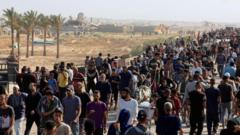An Iranian missile targeted the Soroka Medical Center in Beersheba, Israel, causing significant damage but resulting in minor injuries among patients. The hospital had been evacuated prior to the attack, highlighting the vulnerability of healthcare infrastructures during armed conflicts.
Impact of Conflict on Healthcare: Missile Strikes Hospital in Southern Israel

Impact of Conflict on Healthcare: Missile Strikes Hospital in Southern Israel
An Iranian missile hit Soroka Medical Center in Beersheba, raising concerns over the safety of medical facilities amid ongoing conflicts.
In an alarming incident, the Soroka Medical Center, a prominent hospital complex located in Beersheba, southern Israel, was struck by an Iranian missile on June 19, 2025. As large concrete slabs lay in ruins, emergency responders raced against time to extinguish the flames and secure the area. The aftermath revealed extensive destruction, with debris littering the vicinity and the air thick with acrid smoke from melted materials.
Dr. Vadim Bankovich, an orthopedic surgeon at Soroka, described the moment of impact as a terrifying explosion, likening it to a "massive boom and blast wave." Fortunately, the hospital's management, led by director general Shlomi Codish, had successfully evacuated most patients and staff in recent days, ensuring that they were relocated to secure areas within the facility before the strike occurred. This timely action led to only minor injuries reported among the patients.
The attack was attributed to Iran’s Revolutionary Guards, who claimed through the Fars news agency that the missile was aimed at Israeli military installations situated near the hospital. However, no evidence was provided to substantiate this assertion, and the Israeli military has yet to comment on the claims made.
Dr. Bankovich recounted the harrowing moments after receiving a missile alert on his phone, stating that he and his team quickly sought refuge in a windowless safe space where they had already gathered patients. Upon emerging a short time later, the chaos was evident — toppled cabinets, fallen ceiling panels, and scattered medical equipment underscored the vulnerability of healthcare facilities amid warfare.
As hospitals like Soroka bear the brunt of military conflicts, the situation raises critical questions about the protection of healthcare infrastructures, emphasizing the urgent need for international laws to safeguard medical facilities during times of war. The humanitarian implications are profound, highlighting the necessity for peace in the region.
Dr. Vadim Bankovich, an orthopedic surgeon at Soroka, described the moment of impact as a terrifying explosion, likening it to a "massive boom and blast wave." Fortunately, the hospital's management, led by director general Shlomi Codish, had successfully evacuated most patients and staff in recent days, ensuring that they were relocated to secure areas within the facility before the strike occurred. This timely action led to only minor injuries reported among the patients.
The attack was attributed to Iran’s Revolutionary Guards, who claimed through the Fars news agency that the missile was aimed at Israeli military installations situated near the hospital. However, no evidence was provided to substantiate this assertion, and the Israeli military has yet to comment on the claims made.
Dr. Bankovich recounted the harrowing moments after receiving a missile alert on his phone, stating that he and his team quickly sought refuge in a windowless safe space where they had already gathered patients. Upon emerging a short time later, the chaos was evident — toppled cabinets, fallen ceiling panels, and scattered medical equipment underscored the vulnerability of healthcare facilities amid warfare.
As hospitals like Soroka bear the brunt of military conflicts, the situation raises critical questions about the protection of healthcare infrastructures, emphasizing the urgent need for international laws to safeguard medical facilities during times of war. The humanitarian implications are profound, highlighting the necessity for peace in the region.





















